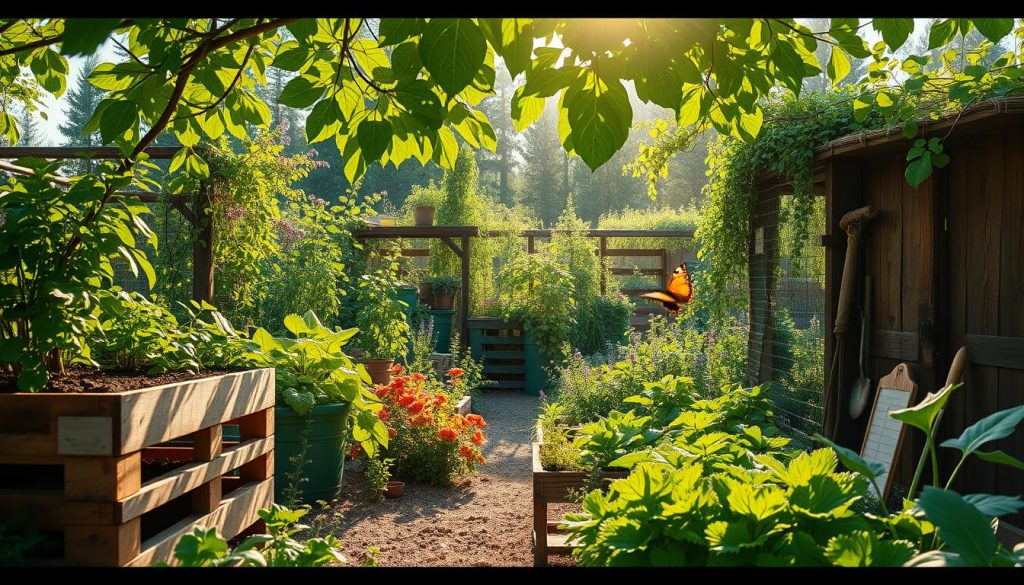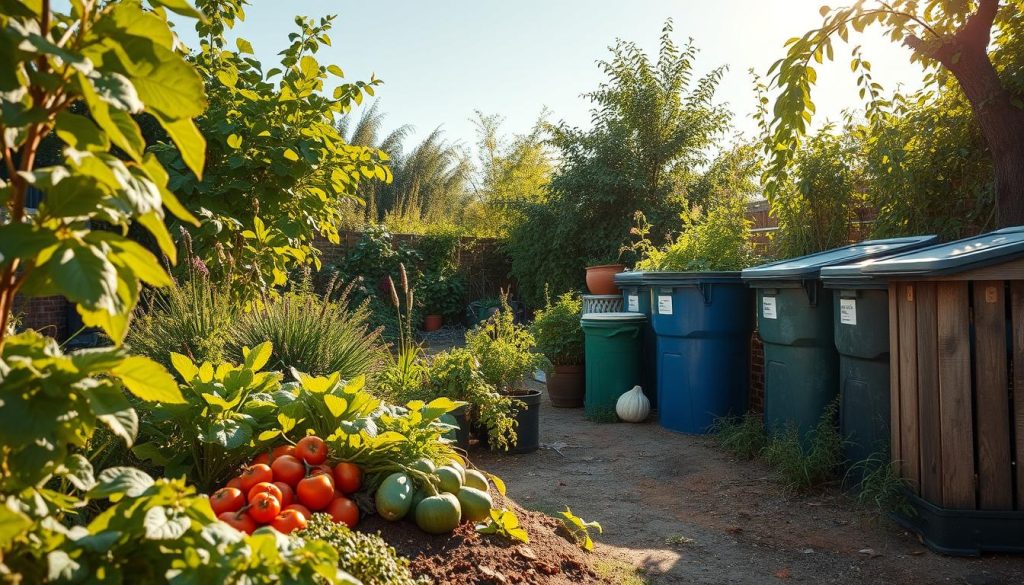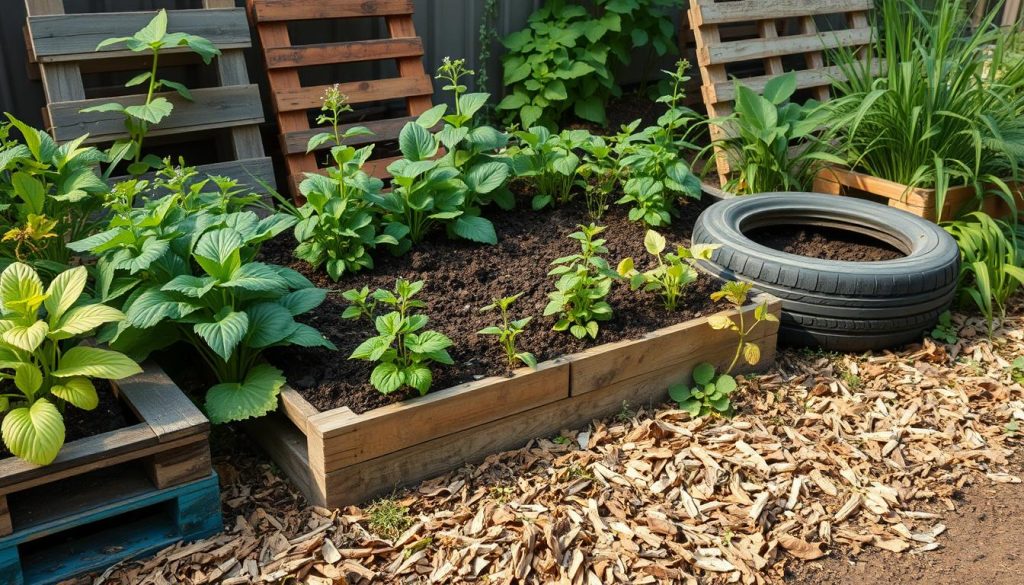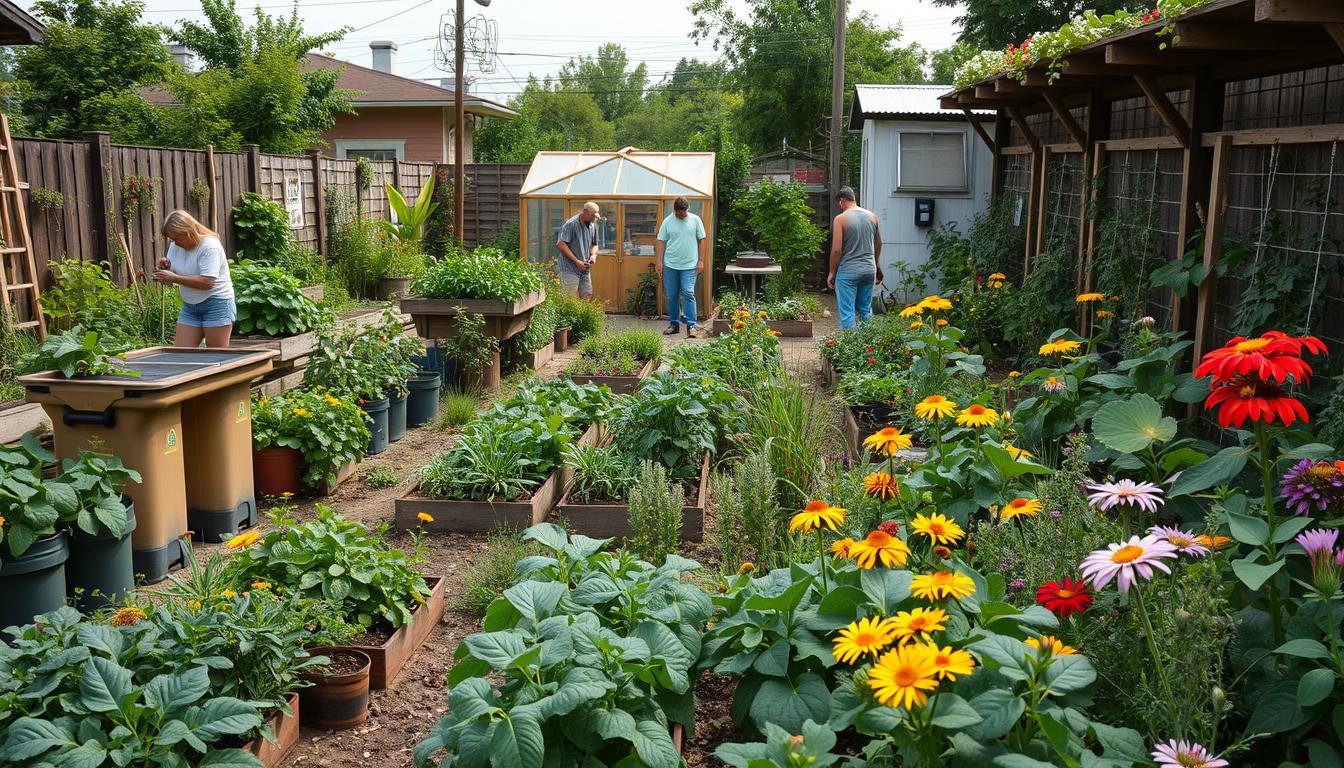I started a journey to cut down on waste and live greener. This path showed me how important it is to link zero-waste living with gardening. It has changed my life for the better, and I’m eager to share it with you.
By using eco-friendly gardening, I’ve cut down on waste and live better for our planet. I’ve found that linking zero-waste living with gardening is good for both the earth and me.
As I keep exploring, I find new ways to blend zero-waste living with gardening. I’m excited to share my stories and advice with you. I hope to motivate you to start your own green gardening journey. This simple step can greatly help our planet and is crucial for a greener future.
Embracing Zero-Waste Living: My Journey Begins
Starting my zero-waste journey made me think more about my daily choices. It’s not just about less waste; it’s about living better for our planet. I began with small steps like using reusable bags and composting. These actions have changed my life and encouraged me to try gardening without waste.
Zero-waste living means more than just cutting down on trash. It’s about living in a way that’s good for our planet. By adding eco-friendly gardening tips to my routine, I’ve made my life more sustainable. I’ve made a few big changes:
- Switched to natural fertilizers and pesticides
- Started using recycled stuff in my garden
- Found ways to save water in my garden
These changes have made my garden better for the planet and for me. Zero-waste gardening is about more than just growing plants. It’s about living in a way that’s kind to our world. 
By living zero-waste and gardening the eco-friendly way, I’ve made a positive change. I hope to inspire others to join me. Together, we can make a big difference with zero-waste gardening.
The Role of Gardening in a Zero-Waste Lifestyle
Gardening is a big part of my zero-waste journey. By choosing organic gardening, I cut down on packaged foods. This move has boosted my health and cut down garden waste.
I now grow my own fruits and veggies. This has cut down my grocery store trips and packaging waste.
Some key benefits of growing my own food include:
- Fresh produce right in my backyard
- Reduced carbon footprint from transportation
- No packaging waste from store-bought produce
I also compost to turn waste into soil. This has greatly helped my garden. It cuts down on synthetic fertilizers and makes my garden more sustainable.
By picking native plants, my garden is beautiful and eco-friendly. It needs less care and waste.

Gardening is a core part of my zero-waste lifestyle. It has made my living more sustainable and green. I aim to keep learning and inspire others to garden too.
Simple Practices for Sustainable Gardening
My journey in environmentally conscious gardening has shown me simple yet impactful practices. Zero-waste composting in the garden is a key one. It turns food scraps and yard waste into nutrient-rich soil that feeds my plants well.
Using Recycled Materials
I’ve begun using recycled items in my garden, like old containers and cardboard tubes. This not only cuts down on waste but also makes my garden unique and personal.
Water Conservation Techniques
To save water, I’ve adopted rainwater harvesting and drip irrigation. These methods cut down my water use while keeping my plants hydrated.
- Collecting rainwater in a barrel for watering plants
- Using drip irrigation to water plants directly at their roots
- Mulching to keep soil moist
These simple steps have made my garden more sustainable. It’s now a place that’s good for me and the planet.
Challenges I Faced on My Path
My journey of linking zero-waste living with gardening wasn’t easy. One big challenge was finding a balance between convenience and sustainability. I had to keep telling myself that the hard work was worth it for a better future.
My garden faced problems like pests and diseases, making me doubt my gardening skills. But I didn’t give up. I looked for help from online forums and local gardening groups. They shared tips and supported those starting out.

- Start small and be patient with yourself as you navigate the world of waste-free gardening
- Don’t be afraid to ask for help and seek out community support when you need it
- Connecting zero-waste living and gardening requires a mindset shift, but it can lead to a more sustainable and fulfilling lifestyle
By adopting waste-free gardening, I’ve cut down my environmental footprint. I’ve also helped create a greener future for my community.
Tips for Others: Start Your Zero-Waste Garden
Starting a zero-waste garden is exciting, and you don’t have to do it alone. Joining a community of gardeners who care about the planet can be a big help. You can share tips, solve problems, and get new ideas to keep your garden growing.
Easy Plants for Beginners
For beginners, choose plants that are easy to grow and need little care. Herbs like basil, mint, and rosemary are perfect. So are tomatoes, zucchini, and leafy greens. These plants are simple to grow and give you lots of food.
Collecting and Using Kitchen Scraps
Using kitchen waste is a key part of zero-waste gardening. Save vegetable peels, eggshells, and coffee grounds. They make great compost that feeds your plants. This way, you help the planet and give your plants what they need.
Building a Supportive Gardening Community
Look for local gardening groups, community centers, or online forums. They’re great places to meet other gardeners who care about the environment. You can share tips, help each other, and even swap plants. A supportive community makes gardening more fun and rewarding.
Your garden is a powerful way to live more sustainably. Start small, use waste wisely, and build a community. Together, you can create a beautiful, zero-waste garden that’s good for you and the planet.

